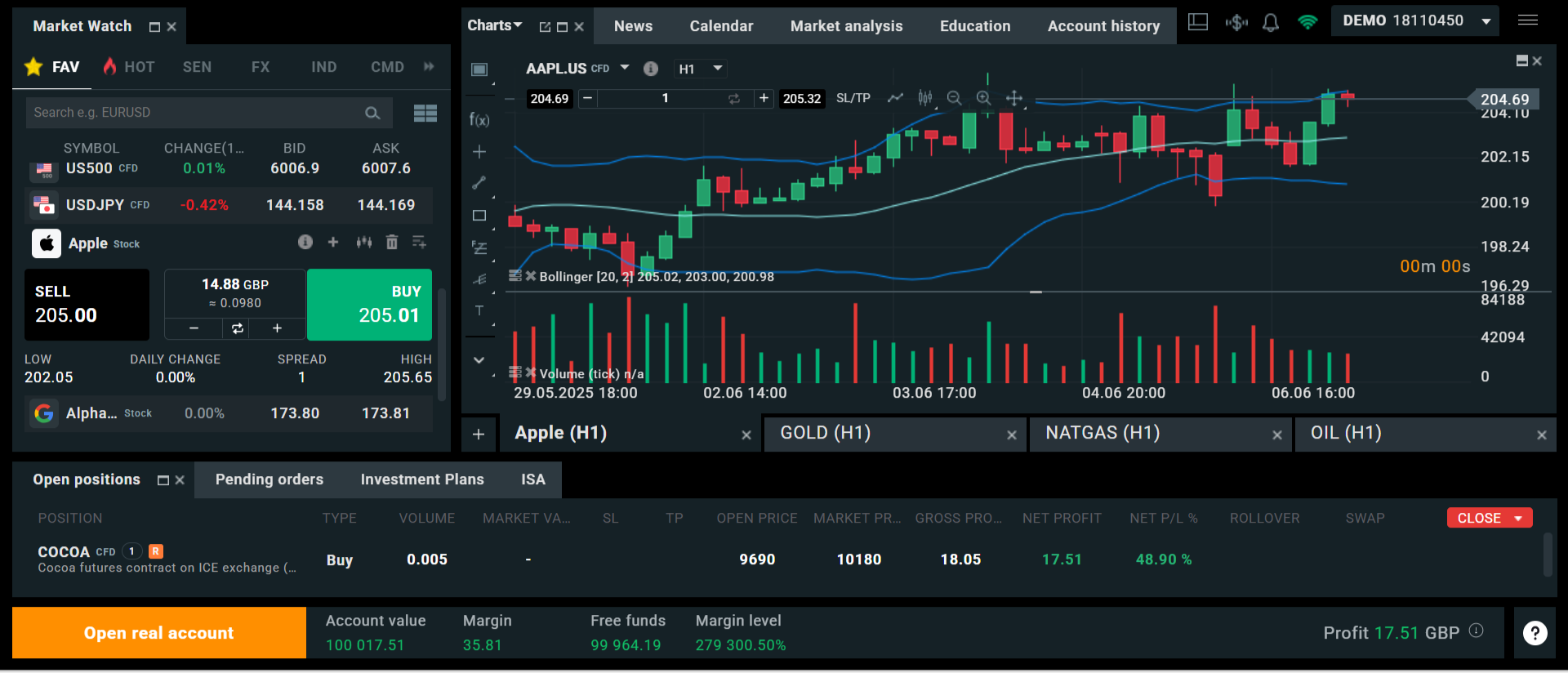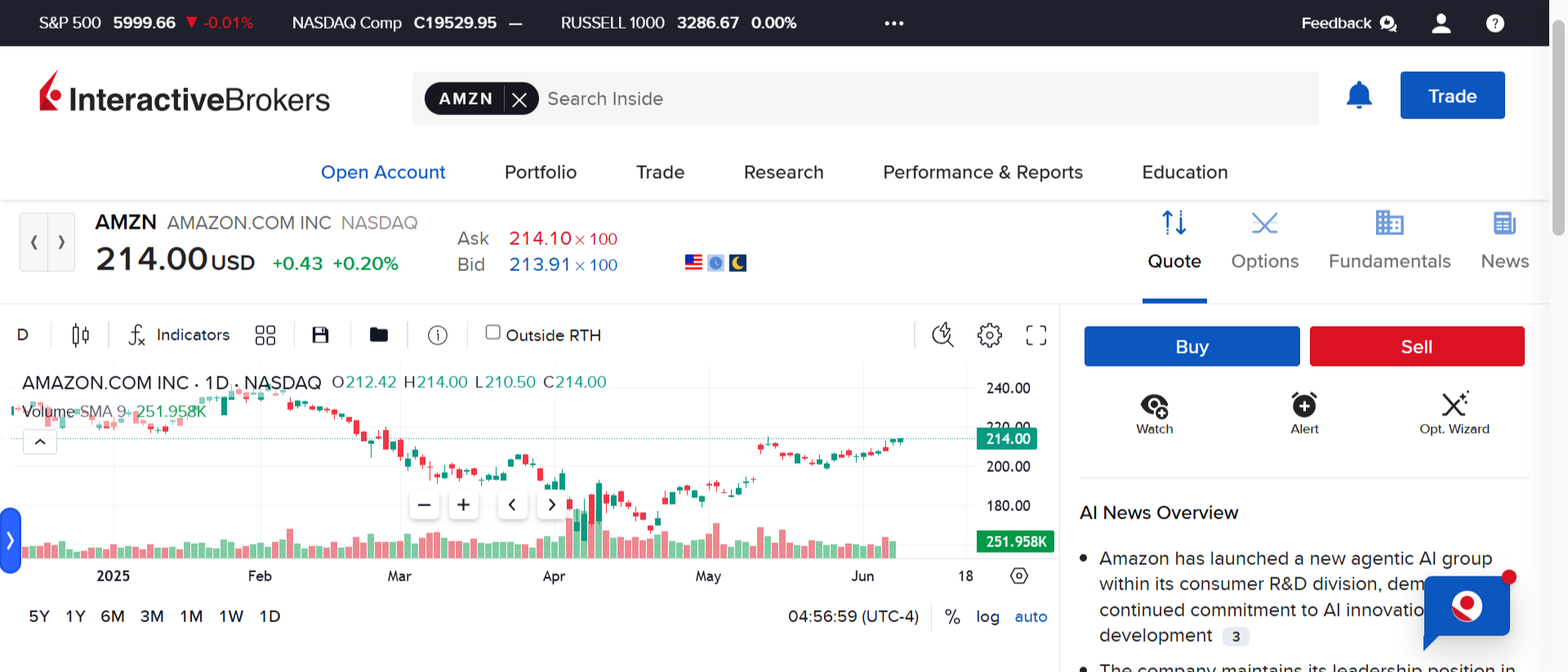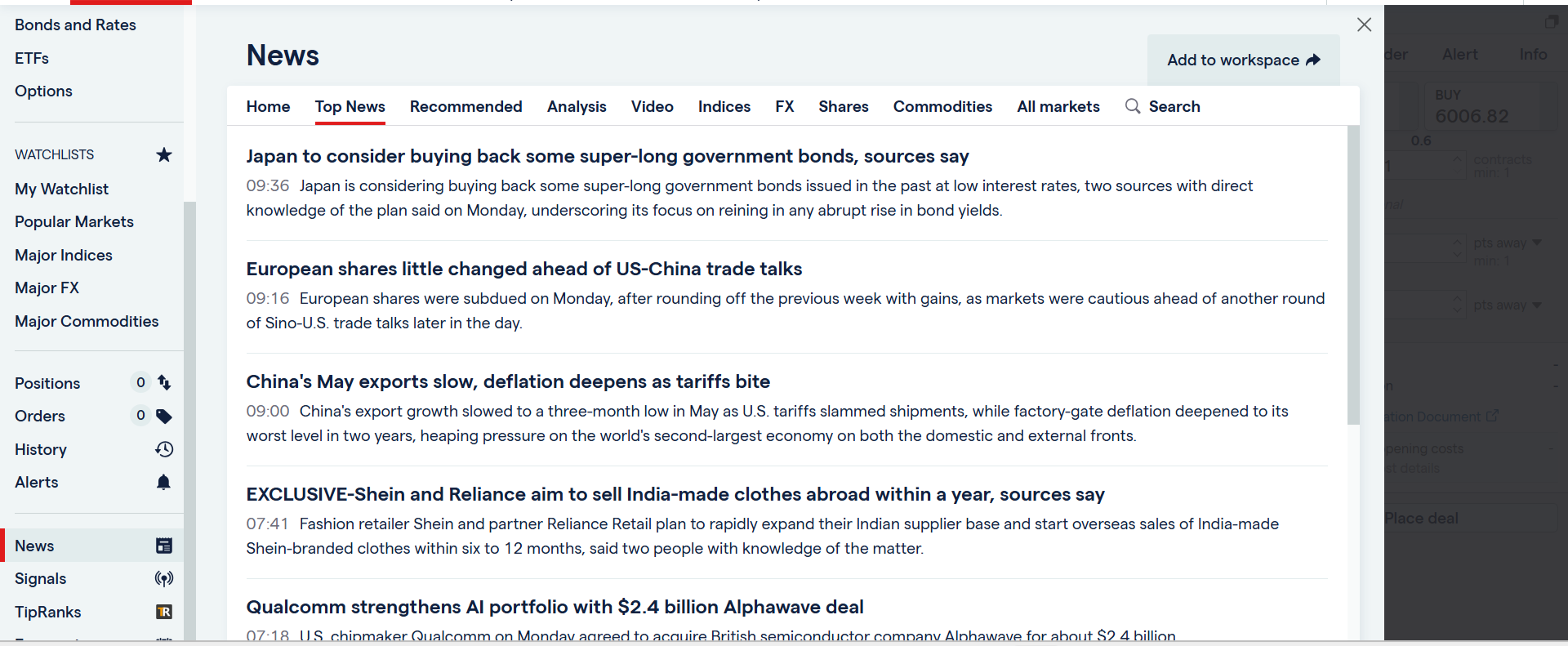Best Brokers With Demat Accounts 2026
Dig into our top brokers offering dematerialised accounts for the secure and efficient storage of electronic securities.
-
1Interactive Brokers (IBKR) is a top brokerage firm offering access to 150 markets in 33 countries and a range of investment services. With 40 years in the field, this company listed on Nasdaq strictly follows the rules set by authorities such as the SEC, FCA, CIRO, and SFC. It's recognized as one of the most reliable brokers for global trading.
Compare The Best Demat Account Brokers Across Key Features
We thoroughly reviewed the top brokers offering Demat accounts - here’s how they compare across key features:
How Secure Are The Top Demat Brokers?
Security is key when it comes to holding your investments digitally. Here's how the best Demat brokers ensure account safety:
Mobile Apps From The Best Demat Brokers
Looking to manage your Demat holdings from your phone? Here’s how the top brokers performed in our mobile trading tests:
Are The Top Demat Brokers Good For Beginners?
Opening your first Demat account? Here’s how our top brokers support beginners:
Are The Top Demat Brokers Suitable For Experienced Investors?
For active investors and long-term equity holders, here's how the best Demat brokers support serious investing:
Accounts Comparison
Compare the trading accounts offered by Best Brokers With Demat Accounts 2026.
Detailed Ratings: Best Demat Account Brokers
See how each top Demat broker scored across our ratings:
Fees & Account Charges Comparison
We compared trading costs to show which of our leading Demat brokers offer the most competitive pricing:
Which Top Demat Brokers Are Most Popular?
Curious where Demat investors are opening accounts? These Demat brokers are seeing the highest demand:
| Broker | Popularity |
|---|---|
| Interactive Brokers |
|
Why Trade With Interactive Brokers?
Interactive Brokers is ideal for seasoned traders due to its robust charting platforms, updated data, and adaptability, especially with the IBKR Desktop application. Its exceptional pricing and advanced order features appeal to traders, and its variety of stocks remains unmatched in the market.
Pros
- IBKR offers exceptional access to global stocks, with thousands of equities available from over 100 market centers in 24 countries, including the recent addition of the Saudi Stock Exchange.
- The TWS platform is designed for intermediate to advanced traders. It includes over 100 order types and a dependable real-time market data feed that rarely experiences downtime.
- Interactive Brokers was named Best US Broker for 2025 by DayTrading.com for its dedication to US traders, ultra-low margin rates, and affordable global market access.
Cons
- Only one active session per account is allowed, which means you can't run the desktop version and mobile app at the same time. This can sometimes lead to a frustrating trading experience.
- IBKR offers many research tools. However, the tools are not uniformly distributed across trading platforms and the web-based 'Account Management' page, causing confusion for the users.
- Customer service may take time to respond, and there may be delays in fixing problems based on tests. It could be difficult to reach the customer service promptly.
Filters
How BrokerListings.com Chose The Top Demat Brokers
We selected the best Demat account brokers based on a comprehensive evaluation of over 200 data points – covering everything from account opening process, charges, and integration with trading platforms, to investor protection and customer support.

What To Look For In a Demat Broker
A Demat account, or Dematerialized account, allows investors to hold shares and other securities in electronic form, removing the risks and inefficiencies of physical certificates.
Whether you’re buying individual stocks, ETFs, bonds, or mutual funds, a Demat account is the core of your investing setup, particularly for traders in India.
When choosing a Demat broker, here are the key things to consider:
What To Look For In a Demat Account
No Nasty Surprises: Account Opening Charges and Annual Maintenance Fees
Let’s start with the basics, because no one wants to get hit with sneaky fees right out of the gate. When we look at Demat accounts, one of the first things we consider is how much it costs to get started and keep the account running.
Here’s what you should focus on when choosing the best trading accounts:
- Account opening charges: Do they charge you just to get set up?
- Annual maintenance fees: Is there a recurring cost for simply keeping the account open?
- Transparency: Are the fees clearly explained upfront?
- Value for money: Do you get decent tools and support in return?
We tested and compared fee structures across multiple platforms to find out who’s offering a genuinely cost-effective experience, without compromizing on usability or trustworthiness.
Top Pick for Low-Cost Setup: If you’re looking for a Demat account that won’t charge you just for walking in the front door, XTB stands out.
XTB charges zero for both account opening and annual maintenance. That’s not a limited-time promotion – it’s their standard offering. We checked. There are no hidden setup fees or backdoor charges for keeping the account open, which is refreshing.
When we signed up to test the process ourselves, it was a smooth and straightforward experience. No unnecessary paperwork or hoops to jump through. Just a clean, digital onboarding experience that took less than 15 minutes.

XTB xStation platform Apple chart
Cut the Fat: Brokerage Charges and Transaction Costs
Once you’re past the account setup stage, the real cost of a Demat account comes down to what you pay per trade. Brokerage charges and transaction costs can quietly eat into your returns if you’re not careful, especially if you’re actively trading or building a diversified portfolio over time.
Here’s what to dig into:
- Brokerage fees per trade: Are they flat or percentage-based?
- Hidden costs: Are there exchange fees, clearing charges, or platform fees not spelt out upfront?
- Value for frequent traders: Do costs go down if you’re trading regularly?
- Clarity and transparency: Are all the charges clearly listed and easy to understand?
Top Pick for Low Transaction Costs: If keeping trading costs low is your top priority (and let’s be honest, it probably is), Interactive Brokers really excels.
They offer some of the lowest brokerage charges in the business, especially for high-volume traders. We found that their commission structure is transparent, tiered based on your trading volume, and – most importantly – surprisingly low. In our testing, fees on standard equity trades were consistently among the cheapest of all the brokers we reviewed.
What we especially appreciated was the granular cost breakdown before and after every trade – no vague “service charges” or unexpected deductions. Everything was itemised, so you always know what you’re paying for. Plus, for active traders, Interactive Brokers rewards volume with even lower rates, which is a big win if you’re placing multiple trades a week or more.

Interactive Brokers platform Amazon chart
Smooth, Slick, and Fun to Use: Platform and User Interface
If the trading platform feels like it was designed in 1999, you’re probably not going to enjoy using it, no matter how reasonable the fees are. A clean, intuitive user interface can make the difference between feeling confident and feeling lost.
Here’s what to pay attention to:
- Ease of navigation: Can you find what you need without clicking through 12 menus?
- Mobile experience: Is the app just as powerful (and glitch-free) as the desktop version?
- Trade execution: How fast and smooth is it to place a buy or sell order?
- Tools and charts: Are they easy to use, or do you need a manual to figure them out?
- Overall design: Is the platform visually transparent, responsive, and enjoyable?
We spent hours on each platform during testing, exploring charts, and navigating every corner of the interface, both on desktop and mobile.
Top Pick for a Seamless Experience: eToro nails the user experience. From the moment we logged in, it was clear this platform was built with the everyday investor in mind. The dashboard is sleek, modern, and enjoyable to use. You can find everything – your watchlists, open positions, portfolio balance – with zero fuss.
What impressed us most was the consistently high quality of the experience across devices. Whether we were using the mobile app on a train or the web platform at our desks, everything worked smoothly. No lags, no crashes, and the interface remained just as intuitive.
Placing trades on eToro feels like second nature. The buy/sell flow is streamlined, the order types are clearly explained, and even the charting tools are simple to master. Plus, for visual learners, the layout and use of icons and colour coding help make sense of the data at a glance.
Smarter Trades Start Here: Research Tools and Resources
Even the lowest fees won’t help if you’re trading blind. Quality research tools can give you the edge, whether you’re into fundamentals, technicals, or just want to know what’s moving the market before it’s old news.
Here’s what to look for when considering research capabilities:
- Market analysis: Is it in-depth, timely, and actionable?
- Charting tools: Are the charts interactive, customizable, and easy to read?
- News and updates: Does the platform keep you plugged into real-time developments?
- Educational content: Are there videos, articles, or tutorials that teach you something valuable?
- Third-party integrations: Can you access data from top-tier sources like Morningstar, Refinitiv, or Reuters?
We didn’t just skim – our team spent hours testing every research section, comparing indicators, and diving into chart settings to see who’s offering real substance and who’s just checking boxes.
Top Pick for Research Firepower: If you’re the kind of trader who likes to dig deep before making a move, IG absolutely delivers.
Their platform offers one of the most comprehensive research suites we’ve seen. From global market insights to technical analysis breakdowns, the content is both timely and genuinely helpful. We especially liked the daily briefings and trade ideas – they’re not generic fluff, but tailored insights backed by data.
When we tested the charting tools, we were seriously impressed. IG integrates with ProRealTime, giving you access to advanced charts, dozens of technical indicators, and fully customizable layouts. Whether you’re a swing trader checking RSI or a long-term investor analysing multi-year trends, the tools are powerful but still user-friendly.

IG Markets platform research and analysis section
More Than Just Stocks: Availability of Investment Options
A solid Demat account should let you go beyond just stocks, whether you’re eyeing mutual funds, exchange-traded funds (ETFs), bonds, or even commodities and currency pairs, flexibility matters. The more choices you have, the easier it is to build a diversified portfolio that fits your goals.
Here’s to focus on when evaluating:
- Range of instruments: Does the broker support more than just equities?
- Access to global markets: Can you invest outside your home market?
- Support for mutual funds and ETFs: Are these easy to find and invest in?
- Fractional investing: Can you buy less than a full share?
- Asset discovery tools: How easy is it to explore and compare different products?
Top Pick for Diverse Assets: When it comes to broad investment options, Pepperstone offers more than you might expect, all delivered through a clean and efficient platform.
While many know Pepperstone primarily for its forex and CFD (Contract for Difference) offerings, we found their range of available markets surprisingly robust. You get access to equities, indices, ETFs, commodities, cryptocurrencies, and yes, plenty of currency pairs too. It’s especially appealing if you’re looking to diversify beyond traditional stocks and mutual funds.
We found it easy to explore and compare instruments by sector, performance, or asset type. The layout makes navigating multiple markets simple, without feeling overwhelmed.
One thing we loved? The depth of global market access. You’re not restricted to one region – Pepperstone gives you the tools and exposure to trade U.S., European, and Asia-Pacific markets, all from one account.
When You Need a Human: Customer Support and Assistance
Let’s face it – no matter how intuitive the platform is, you’re going to have questions at some point. Maybe it’s about a pending order, a document upload, or a sudden market move that’s got you second-guessing your strategy. That’s when responsive, reliable customer support can make all the difference.
Here’s what to look for in this area:
- Availability: Is support offered 24/5 or 24/7?
- Channels: Can you reach them via live chat, email, and phone, or just one option buried deep in a menu?
- Response times: How fast do you get help when you need it?
- Language support: Is help available in your local language?
- Quality of assistance: Are the agents knowledgeable, or just reading from a script?
We reached out to each broker’s support teams ourselves, at odd hours and with various questions, just to see how they held up under pressure.
Top Pick for Hands-On Help: Once again, XTB earns a top spot – this time for its outstanding customer support.
We were genuinely impressed by how fast and helpful their team was. During our own testing, live chat responses came in within 30 seconds during market hours, and we were connected to a real, knowledgeable agent, not a chatbot trying to guess what we meant.
Support is available via chat, email, and phone, and the language options are broad – perfect if English isn’t your first language (which it won’t be for many Indians).
Even more impressive? XTB assigns a dedicated account manager once your account is up and running. It’s a small touch that goes a long way when you’re trying to navigate a tricky trade or resolve an issue quickly.
We asked some intentionally difficult questions – stuff that would usually get a canned “please check our FAQ” reply elsewhere – but XTB’s reps provided clear, relevant answers and even followed up to make sure our issues were resolved.
Locked Down and Legit: Security Measures and Regulations
When it comes to your investments, trust isn’t optional – it’s vital. A Demat account might have low fees and slick tools, but if it’s not tightly regulated or secure, that’s a risk no smart investor should take.
Here’s what we focused on when evaluating safety and compliance:
- Regulatory oversight: Is the broker licensed by top-tier regulators?
- Fund protection: Is client money kept in segregated accounts?
- Data security: Is your personal and financial information encrypted?
- Account protection: Are two-factor authentication (2FA) and other security tools available?
- Transparency: Is the broker upfront about how they protect you and your funds?
Top Pick for Bulletproof Security: If there’s one broker that takes regulation and security to another level, it’s Interactive Brokers. We have high expectations going in, and they delivered.
They’re regulated by multiple top-tier authorities, including the U.S. Securities and Exchange Commission (SEC), the Financial Industry Regulatory Authority (FINRA), and the Financial Conduct Authority (FCA) in the United Kingdom. That means they’re not just ticking boxes – they’re meeting some of the highest compliance standards in the world.
In our testing, Interactive Brokers offered robust login security, including two-factor authentication, detailed activity logs, and strong account recovery options. Every time we logged in, we felt reassured, not annoyed.
We also confirmed that client funds are held in fully segregated accounts, which adds an extra layer of protection if anything ever goes sideways. And if you’re wondering about encryption? Yes, everything from trading activity to bank transfers is protected with enterprise-grade tech.
